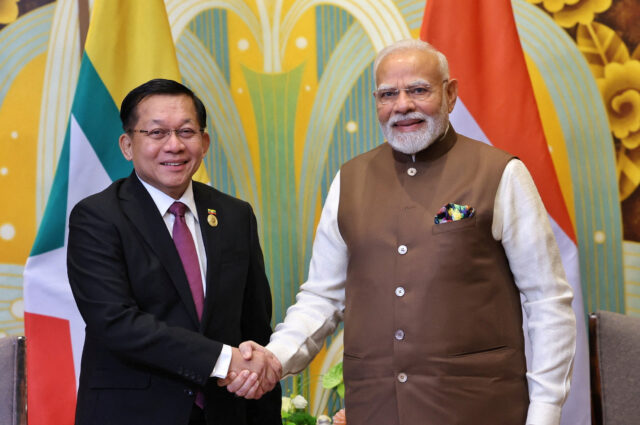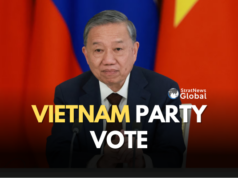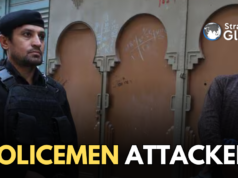
The top trending news stories about Myanmar as of Thursday was a conspiracy-laden story about the Cocos Islands, whether Elon Musk’s Starlink was fuelling scam centres in that country and an earthquake.
The only civil war-related stories was a news agency’s photo report on a village ravaged by fighting and the para-glider attack on a Buddhist festival that killed 24 people, the last about a week old.
It would appear the civil war in that country, now into its fourth year, doesn’t hold the same attraction as perhaps the Gaza war, or rather peace now that Donald Trump has stepped in and got the protagonists to stop fighting.
It is least discussed and written about even in India despite sharing a border running more than 1,600-km along the sensitive northeastern states. The stakes are higher now that the military junta has announced it will hold elections in December.
Scholars believe the Myanmar Army, despite suffering severe territorial reverses, military defeats and casualties, has retained its institutional solidarity and much of its coherence.
The push for elections is a calculated one: it can be held only in 102 of 330 townships where the army retains control. But elections are an instrument for the junta to achieve other ends. Victory is assured for the “King’s Party, the USDP since all other political parties have been banned or outlawed.
It would enable junta leader Gen Min Aung Hlaing to depart into the sunset without having to account for his 2021 coup that drove the country into civil war. His departure will bring in a new set of military leaders probably beholden to Aung Hlaing.
According to a report dated April 9th in the online EastAsiaForum.org, Lt. Gen. Kyaw Swar Lin, who is some 16 courses junior to the junta chief, is seen as the potential successor. He “lacks significant combat experience,” says the report, “but has held key administrative roles within the commander-in-chief’s office.”
The report points to two other officers who could be in the running for deputy C-in-C and joint chief of staff, positions below Swar Lin: Gen Ko Ko Oo who currently heads special operations, and Maj. Gen. Than Hitke, presently army chief of staff. Both are under scrutiny for their reported brutal tactics in the Sagaing region in October last year.
An Indian view is that the civilian face could be former general Than Shwe, who was also head of state and government before stepping down in 2011.
What about technocrats who could bring specialised skills and expertise to government? There are possibly a few left in Myanmar but who would be interested in joining the new government post elections is not clear. That stems from the point that most ethnic groups will reject the poll result.
The Arakan Army, for instance, considered the most powerful among the ethnic armed organisations given it controls 80% of Rakhine state, has said it will not allow any voting to take place.
The same stand has been taken by the Kachin Independence Army which holds sway over northern Myanmar, and by the Chins who are based along the borders with Mizoram and Manipur in India’s northeast. Likewise the Ta’ang National Liberation Army which operates in northern Shan state.
But three ethnic Karen groups aligned with the junta have promised to provide security during the elections, says a report in the online Irrawaddy journal. Also the majority ethnic Bamars who make up the bulk of the army, will back the junta’s candidates.
For India the choice is pretty simple. Diplomats and officials say “We are optimistic and hopeful that polls will bring resolution to the conflict.”
There’s also a caveat. As a scholar put it “Any government that comes to power will have to keep our concerns, so no foreign power should be able to use Myanmar territory for anti-India purposes.”
That means the presence of northeastern separatist groups like the ULFA (United Liberation Front of Assam) and the two Naga factions (Isaac and Khaplang) in Myanmar is worrying.
Add to that reports that the runaway on Cocos Island, 55 km from India’s Andaman islands, is being extended to accommodate possibly Chinese fighter jets.
India is interested in accessing Myanmar’s rare earths concentrated in Kachin state bordering China. Reports say the Kachin Independence Army controls key mines with processing being done in China.
For India, security is a major concern when it comes to Myanmar. The civil war has left armed groups in control of many parts of the country and there’s been a huge surge in trafficking, whether of drugs, arms or even people. An election, howsoever flawed, might be the proverbial light at the end of the tunnel.
Thirty eight years in journalism, widely travelled, history buff with a preference for Old Monk Rum. Current interest/focus spans China, Technology and Trade. Recent reads: Steven Colls Directorate S and Alexander Frater's Chasing the Monsoon. Netflix/Prime video junkie. Loves animal videos on Facebook. Reluctant tweeter.




